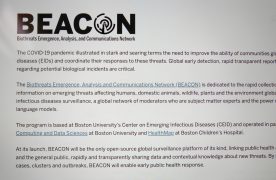Boston University could soon become a research archive, a forum for African leaders and an influence on U.S. foreign policy, if the plans of a new assistant to President Jon Westling are realized.
Charles Stith is following his appointment as diplomat and envoy to Tanzania for the Clinton administration as the newly named assistant to Westling. Stith said he hopes to establish an African Presidential Archives and Research Center at Boston University to benefit the college community and America on a whole.
“This is an opportunity not only for the Boston University community to access unique individuals, but for our country to have access to these leaders,” Stith said.
The center will be a meeting place for democratically elected African leaders to gather and discuss issues regarding the relationship between Africa and the United States, Westling said. There will also be a selection of these leaders’ papers, forming part of what Westling called a “research collection to add to Boston University’s resources.”
Westling said he has long known of Stith. Before working for Clinton, the reverend was Boston’s peripatetic preacher. Stith has also written numerous articles and editorials in major newspapers including The Boston Globe, the Boston Herald and The New York Times. He has also authored a book, “Political Religion,” in 1995.
Westling said when the former ambassador contacted him with an idea for the center, he was instantly interested.
“[Stith] is an excellent fit with the University’s resources in the study of Africa,” Westling said.
It was a mutual attraction. Stith said he was specifically drawn to BU because of its “long lasting history of African studies and its international reputation for research of Africa and for African language studies.” He also mentioned his “great respect” for Westling and Chancellor John Silber.
“It just made sense that it would be an excellent match,” Stith said.
He said his experience in Tanzania will influence the type of forum he helps to establish. Stith went to Tanzania to help carry out the government’s “African Growth and Opportunity Initiative.” He said he accomplished a number of successes in terms of trade and investment initiatives, and was involved in discussions beyond Tanzania’s borders, with countries such as the Congo, Burundi and Rwanda.
Drawing on his work as ambassador, Stith discussed U.S.-African relations during the Clinton years, at an International Relations Forum on Bay State Road last night. He stressed the importance of creating bilateral ties with the African subcontinent through trade instead of aid.
Stith said his project can help Americans “see through the eyes of the architects,” the current leaders steering African nations into an increasingly interdependent global arena. He said he questioned whether the continent will be regarded as “Africa the problem” or “Africa the potential” as the Bush administration carves out its policies.
This is an account occasionally used by the Daily Free Press editors to post archived posts from previous iterations of the site or otherwise for special circumstance publications. See authorship info on the byline at the top of the page.












